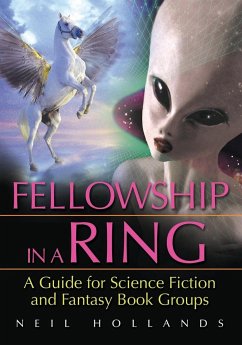- Broschiertes Buch
- Merkliste
- Auf die Merkliste
- Bewerten Bewerten
- Teilen
- Produkt teilen
- Produkterinnerung
- Produkterinnerung
This comprehensive, spirited, and often laugh-out-loud funny handbook will help you start, maintain, or enhance a science fiction and fantasy book group. Bring fantasy and science fiction readers together for scintillating discussions with Fellowship in a Ring: A Guide for Science Fiction and Fantasy Book Groups. Providing everything you need to get started, the book offers detailed guidelines for some 50 fantasy and science fiction titles, plus guides for some 40 popular speculative fiction themes. For each of the featured titles, the book provides bibliographic information, author…mehr
Andere Kunden interessierten sich auch für
![Read On...Fantasy Fiction Read On...Fantasy Fiction]() Neil HollandsRead On...Fantasy Fiction53,99 €
Neil HollandsRead On...Fantasy Fiction53,99 €![Emanuel Goldberg and His Knowledge Machine Emanuel Goldberg and His Knowledge Machine]() Michael BucklandEmanuel Goldberg and His Knowledge Machine65,99 €
Michael BucklandEmanuel Goldberg and His Knowledge Machine65,99 €![Biblia's Guide to Warrior Librarianship Biblia's Guide to Warrior Librarianship]() Amanda CredaroBiblia's Guide to Warrior Librarianship41,99 €
Amanda CredaroBiblia's Guide to Warrior Librarianship41,99 €![Metadata and Its Applications in the Digital Library Metadata and Its Applications in the Digital Library]() Jia LiuMetadata and Its Applications in the Digital Library51,99 €
Jia LiuMetadata and Its Applications in the Digital Library51,99 €![Pop-Up Books Pop-Up Books]() Nancy BluemelPop-Up Books57,99 €
Nancy BluemelPop-Up Books57,99 €![Lessons from Library Power Lessons from Library Power]() Douglas ZweizigLessons from Library Power57,99 €
Douglas ZweizigLessons from Library Power57,99 €![Key Words, Concepts and Methods for Information Age Instruction Key Words, Concepts and Methods for Information Age Instruction]() Daniel CallisonKey Words, Concepts and Methods for Information Age Instruction49,99 €
Daniel CallisonKey Words, Concepts and Methods for Information Age Instruction49,99 €-
-
-
This comprehensive, spirited, and often laugh-out-loud funny handbook will help you start, maintain, or enhance a science fiction and fantasy book group. Bring fantasy and science fiction readers together for scintillating discussions with Fellowship in a Ring: A Guide for Science Fiction and Fantasy Book Groups. Providing everything you need to get started, the book offers detailed guidelines for some 50 fantasy and science fiction titles, plus guides for some 40 popular speculative fiction themes. For each of the featured titles, the book provides bibliographic information, author background, a plot summary, notes on appeal points, discussion questions, other resources to consult, and suggested read-alikes. You'll find instructions on how to get a group started, tips for helping fantasy and sci-fi readers get along, hints for understanding the genres and subgenres, and more. The book also offers materials useful to collection development, display building, and programming. Featuring books that run the gamut from literary genre novels to classic pulp stories, Fellowship in a Ring can help you avoid common pitfalls and build a flourishing community of satisfied book group adherents.
Hinweis: Dieser Artikel kann nur an eine deutsche Lieferadresse ausgeliefert werden.
Hinweis: Dieser Artikel kann nur an eine deutsche Lieferadresse ausgeliefert werden.
Produktdetails
- Produktdetails
- Verlag: Libraries Unlimited
- Seitenzahl: 316
- Erscheinungstermin: 30. Dezember 2009
- Englisch
- Abmessung: 254mm x 178mm x 17mm
- Gewicht: 598g
- ISBN-13: 9781591587033
- ISBN-10: 1591587034
- Artikelnr.: 26994462
- Herstellerkennzeichnung
- Libri GmbH
- Europaallee 1
- 36244 Bad Hersfeld
- gpsr@libri.de
- Verlag: Libraries Unlimited
- Seitenzahl: 316
- Erscheinungstermin: 30. Dezember 2009
- Englisch
- Abmessung: 254mm x 178mm x 17mm
- Gewicht: 598g
- ISBN-13: 9781591587033
- ISBN-10: 1591587034
- Artikelnr.: 26994462
- Herstellerkennzeichnung
- Libri GmbH
- Europaallee 1
- 36244 Bad Hersfeld
- gpsr@libri.de
Neil Hollands
Acknowledgments Preface Introduction Chapter 1-Starting and Facilitating
Your Group Why Start a Science Fiction/Fantasy Book Group? Forming a
Science Fiction/Fantasy Book Group Finding Members The Organizational
Meeting The Meeting: Time, Place, and Format The Roles of Group Leaders
Basic Communications Managing and Leading the Discussion Resolving
Controversies and Problems Motivating and Energizing Selecting Titles Book
Characteristics That Lead to Good Discussions In Print and Easy to Find
Length Stand-Alones vs. Series Character-Driven, Idea-Driven, Plot-Driven,
or Style-Driven Established Writers vs. Newer Writers Political, Ethical,
and Philosophical Choices Genre Ideas with Real-World Analogs Strong
Settings and Frames Young Adult and Children's Books Controversial Books
Seasonal Appropriateness and Recurring Topics Award Winners and Classics
Balance Talking about Books Successfully Managing Discussion Introduce the
Book, Author, and Topic Clearly Prepare and Use Discussion Questions Wisely
Find Out What Your Readers Want to Discuss Select a Few Short Passages to
Read Aloud in a Pinch Once the Conversation Gets Rolling, Stay out of the
Way Watch Out for Signs of Trouble One Thing at a Time Don't Let
Generalizations Kill the Discussion In a Pinch, Use Formal Means to Combat
Recurring Problems Suggestions for Talking about a Shared Book General
Reactions Author Time and Place of Origin Point of View Characters Pacing
Settings and Frames Central and Secondary Conflicts Plotting Genre Style
Connections The Ending Dare to Theme: An Alternative to Reading the Same
Book Problems of the One-Book Group The Thematic Group: Methods and
Benefits Preventing and Combating the Downside of Themes Advice for
Discussion: Thematic Groups Success with Fantasy and Science Fiction
Readers Wizards vs. Androids: Helping Fantasy and Science Fiction Readers
Get Along Bestiary: The Care and Feeding of Common Science Fiction/Fantasy
Reader Types Ideas for Extra Fun Answer a Reading Question Invite an Author
Watch a Movie or Television Program Together Bring Thematic Food and Drink
Design Games and Puzzles Have a Book or Toy Exchange Change the Location
Read outside Your Usual Parameters Rate the Book Stage a Group Reading Try
a Service Project Celebrate or Remember Together Invite Guests Compile Your
Favorites Start a Group Scrapbook, Website, or Blog Make Reading
Resolutions Chapter 2-Understanding the Genres Classifying Fantasy and
Science Fiction The Subgenres of Fantasy Epic/Quest/High Fantasy
Coming-of-Age Fantasy Political Fantasy Alternate Historical Fantasy
"Realistic" Epic Fantasy Hero Fantasy Dark Fantasy Urban Fantasy Adventures
Fantasy Romance Humorous Fantasy Literary Fantasy The New Weird Fables
Mythic Fantasy Science Fantasy The Subgenres of Science Fiction Space Opera
Planetary Romance/Up Close with Aliens Hard SF Time Travel/Alternate
History New Wave/Social Science Fiction Future History
Utopia/Dystopia/Political SF Apocalypse and Post-Apocalypse
Cyberpunk/Pessimistic Futures Mystery Crossovers and Future Thrillers
Military and Other Adventure Science Fiction Coming-of-Age Science Fiction
Slipstream/Literary SF Science Fiction Humor Short Stories Science Fantasy
Glossary Basic Discussion Questions for Science Fiction Basic Discussion
Questions for Fantasy Fiction Chapter 3-25 Great Fantasy Novels for Book
Groups 25 Great Fantasy Novels for Book Groups 100 More Recommended Fantasy
Authors and Books for Discussion Chapter 4-25 Great Science Fiction Novels
for Book Groups 25 Great Science Fiction Novels for Book Groups 100 More
Recommended Science Fiction Authors and Books for Discussion Chapter
5-Themes for Speculative Fiction Discussion A Note on Thematic Book
Selections Adapted into Films: Screen-Worthy Speculative Fiction Alternate
Histories: Stitches in Time Ancient and Medieval Worlds: Give 'Em an Old
Times Revision Animals: Feature Creatures in Speculative Fiction
Antiheroes: Black Hat, Heart of Gold Apocalyptic Fiction: Stop the World;
We Want to Get On Computers, Internet, and Virtual Realities: Books with
Byte The Cost of Magic: Spell-Bound and Over-Cast in Fantasy Fiction
Diversity: A Fantastic Choir of Many Voices Environmental Issues: Reading
the Green The Fairy World: "Sidhe" Moves in Mysterious Ways Families:
Relative-ly Good Speculative Fiction Fantasy before 1970: The Genre before
Tolkien Gender Roles: A Woman's Place Is in the Tome Gods and Religion: A
Divine Collection of Speculative Fiction Golden Age and New Wave: Science
Fiction through 1980 Good and Evil: The Story of the Moral Is. Graphic
Novels: Stand-Up Comics in Science Fiction and Fantasy Hard SF: Putting the
Science in Science Fiction Health, Medicine, Biology, and Genetics: Science
Fiction Gets Up Close and Physical Horror Crossovers: Speculative Fiction
So Scary It's Good Immortals, Longevity, and Rejuvenation: The Door to
Forever Jokers Wild: Humor in Speculative Fiction Literary Crossovers:
Gentrifying Genre Fiction Military Speculative Fiction: Genre Get Your Gun
Monster Mash: Reading Where the Wild Things Are Musical Extravaganza: Song
Books the Speculative Fiction Way Mystery Crossovers: Crimes of the
Imagination Myths, Fables, and Legends: The Lure of Lore Paranormal
Adventures: Hex and the City Planetary Romance: Seeking Out Strange New
Worlds, Red Shirt Optional Political Science Fiction and Fantasy: Governing
Pleasures Quests: Searching for the Best in Speculative Fiction Rebellion
in Speculative Fiction: You Say You Want a Revolution Robots, Cyborgs,
Androids, and AI: Breathing Artificial Life into Science Fiction Science
Fantasy: Two Genres for the Price of One Short Stories: Quick Reads, Big
Ideas Slipstream and the New Weird: Frontiers of the Imagination Space
Opera: Reading the Masters of the Universe Steampunk and Victoriana: High
Adventure, High Attitude, High Tea Time Travel: Across the Space-Time
Continuum in Speculative Fiction Watery Worlds: Speculative Fiction on the
High Seas Wormholes and Wardrobes: The World Next Door Young Adult Fantasy:
Not Just for Teens Young Adult Science Fiction: Not Just for Teens 100 More
Themes to Explore Appendix A: Chronology of Science Fiction/Fantasy History
Appendix B: Resources for Further Study Author Index Title and Series Index
Your Group Why Start a Science Fiction/Fantasy Book Group? Forming a
Science Fiction/Fantasy Book Group Finding Members The Organizational
Meeting The Meeting: Time, Place, and Format The Roles of Group Leaders
Basic Communications Managing and Leading the Discussion Resolving
Controversies and Problems Motivating and Energizing Selecting Titles Book
Characteristics That Lead to Good Discussions In Print and Easy to Find
Length Stand-Alones vs. Series Character-Driven, Idea-Driven, Plot-Driven,
or Style-Driven Established Writers vs. Newer Writers Political, Ethical,
and Philosophical Choices Genre Ideas with Real-World Analogs Strong
Settings and Frames Young Adult and Children's Books Controversial Books
Seasonal Appropriateness and Recurring Topics Award Winners and Classics
Balance Talking about Books Successfully Managing Discussion Introduce the
Book, Author, and Topic Clearly Prepare and Use Discussion Questions Wisely
Find Out What Your Readers Want to Discuss Select a Few Short Passages to
Read Aloud in a Pinch Once the Conversation Gets Rolling, Stay out of the
Way Watch Out for Signs of Trouble One Thing at a Time Don't Let
Generalizations Kill the Discussion In a Pinch, Use Formal Means to Combat
Recurring Problems Suggestions for Talking about a Shared Book General
Reactions Author Time and Place of Origin Point of View Characters Pacing
Settings and Frames Central and Secondary Conflicts Plotting Genre Style
Connections The Ending Dare to Theme: An Alternative to Reading the Same
Book Problems of the One-Book Group The Thematic Group: Methods and
Benefits Preventing and Combating the Downside of Themes Advice for
Discussion: Thematic Groups Success with Fantasy and Science Fiction
Readers Wizards vs. Androids: Helping Fantasy and Science Fiction Readers
Get Along Bestiary: The Care and Feeding of Common Science Fiction/Fantasy
Reader Types Ideas for Extra Fun Answer a Reading Question Invite an Author
Watch a Movie or Television Program Together Bring Thematic Food and Drink
Design Games and Puzzles Have a Book or Toy Exchange Change the Location
Read outside Your Usual Parameters Rate the Book Stage a Group Reading Try
a Service Project Celebrate or Remember Together Invite Guests Compile Your
Favorites Start a Group Scrapbook, Website, or Blog Make Reading
Resolutions Chapter 2-Understanding the Genres Classifying Fantasy and
Science Fiction The Subgenres of Fantasy Epic/Quest/High Fantasy
Coming-of-Age Fantasy Political Fantasy Alternate Historical Fantasy
"Realistic" Epic Fantasy Hero Fantasy Dark Fantasy Urban Fantasy Adventures
Fantasy Romance Humorous Fantasy Literary Fantasy The New Weird Fables
Mythic Fantasy Science Fantasy The Subgenres of Science Fiction Space Opera
Planetary Romance/Up Close with Aliens Hard SF Time Travel/Alternate
History New Wave/Social Science Fiction Future History
Utopia/Dystopia/Political SF Apocalypse and Post-Apocalypse
Cyberpunk/Pessimistic Futures Mystery Crossovers and Future Thrillers
Military and Other Adventure Science Fiction Coming-of-Age Science Fiction
Slipstream/Literary SF Science Fiction Humor Short Stories Science Fantasy
Glossary Basic Discussion Questions for Science Fiction Basic Discussion
Questions for Fantasy Fiction Chapter 3-25 Great Fantasy Novels for Book
Groups 25 Great Fantasy Novels for Book Groups 100 More Recommended Fantasy
Authors and Books for Discussion Chapter 4-25 Great Science Fiction Novels
for Book Groups 25 Great Science Fiction Novels for Book Groups 100 More
Recommended Science Fiction Authors and Books for Discussion Chapter
5-Themes for Speculative Fiction Discussion A Note on Thematic Book
Selections Adapted into Films: Screen-Worthy Speculative Fiction Alternate
Histories: Stitches in Time Ancient and Medieval Worlds: Give 'Em an Old
Times Revision Animals: Feature Creatures in Speculative Fiction
Antiheroes: Black Hat, Heart of Gold Apocalyptic Fiction: Stop the World;
We Want to Get On Computers, Internet, and Virtual Realities: Books with
Byte The Cost of Magic: Spell-Bound and Over-Cast in Fantasy Fiction
Diversity: A Fantastic Choir of Many Voices Environmental Issues: Reading
the Green The Fairy World: "Sidhe" Moves in Mysterious Ways Families:
Relative-ly Good Speculative Fiction Fantasy before 1970: The Genre before
Tolkien Gender Roles: A Woman's Place Is in the Tome Gods and Religion: A
Divine Collection of Speculative Fiction Golden Age and New Wave: Science
Fiction through 1980 Good and Evil: The Story of the Moral Is. Graphic
Novels: Stand-Up Comics in Science Fiction and Fantasy Hard SF: Putting the
Science in Science Fiction Health, Medicine, Biology, and Genetics: Science
Fiction Gets Up Close and Physical Horror Crossovers: Speculative Fiction
So Scary It's Good Immortals, Longevity, and Rejuvenation: The Door to
Forever Jokers Wild: Humor in Speculative Fiction Literary Crossovers:
Gentrifying Genre Fiction Military Speculative Fiction: Genre Get Your Gun
Monster Mash: Reading Where the Wild Things Are Musical Extravaganza: Song
Books the Speculative Fiction Way Mystery Crossovers: Crimes of the
Imagination Myths, Fables, and Legends: The Lure of Lore Paranormal
Adventures: Hex and the City Planetary Romance: Seeking Out Strange New
Worlds, Red Shirt Optional Political Science Fiction and Fantasy: Governing
Pleasures Quests: Searching for the Best in Speculative Fiction Rebellion
in Speculative Fiction: You Say You Want a Revolution Robots, Cyborgs,
Androids, and AI: Breathing Artificial Life into Science Fiction Science
Fantasy: Two Genres for the Price of One Short Stories: Quick Reads, Big
Ideas Slipstream and the New Weird: Frontiers of the Imagination Space
Opera: Reading the Masters of the Universe Steampunk and Victoriana: High
Adventure, High Attitude, High Tea Time Travel: Across the Space-Time
Continuum in Speculative Fiction Watery Worlds: Speculative Fiction on the
High Seas Wormholes and Wardrobes: The World Next Door Young Adult Fantasy:
Not Just for Teens Young Adult Science Fiction: Not Just for Teens 100 More
Themes to Explore Appendix A: Chronology of Science Fiction/Fantasy History
Appendix B: Resources for Further Study Author Index Title and Series Index
Acknowledgments Preface Introduction Chapter 1-Starting and Facilitating
Your Group Why Start a Science Fiction/Fantasy Book Group? Forming a
Science Fiction/Fantasy Book Group Finding Members The Organizational
Meeting The Meeting: Time, Place, and Format The Roles of Group Leaders
Basic Communications Managing and Leading the Discussion Resolving
Controversies and Problems Motivating and Energizing Selecting Titles Book
Characteristics That Lead to Good Discussions In Print and Easy to Find
Length Stand-Alones vs. Series Character-Driven, Idea-Driven, Plot-Driven,
or Style-Driven Established Writers vs. Newer Writers Political, Ethical,
and Philosophical Choices Genre Ideas with Real-World Analogs Strong
Settings and Frames Young Adult and Children's Books Controversial Books
Seasonal Appropriateness and Recurring Topics Award Winners and Classics
Balance Talking about Books Successfully Managing Discussion Introduce the
Book, Author, and Topic Clearly Prepare and Use Discussion Questions Wisely
Find Out What Your Readers Want to Discuss Select a Few Short Passages to
Read Aloud in a Pinch Once the Conversation Gets Rolling, Stay out of the
Way Watch Out for Signs of Trouble One Thing at a Time Don't Let
Generalizations Kill the Discussion In a Pinch, Use Formal Means to Combat
Recurring Problems Suggestions for Talking about a Shared Book General
Reactions Author Time and Place of Origin Point of View Characters Pacing
Settings and Frames Central and Secondary Conflicts Plotting Genre Style
Connections The Ending Dare to Theme: An Alternative to Reading the Same
Book Problems of the One-Book Group The Thematic Group: Methods and
Benefits Preventing and Combating the Downside of Themes Advice for
Discussion: Thematic Groups Success with Fantasy and Science Fiction
Readers Wizards vs. Androids: Helping Fantasy and Science Fiction Readers
Get Along Bestiary: The Care and Feeding of Common Science Fiction/Fantasy
Reader Types Ideas for Extra Fun Answer a Reading Question Invite an Author
Watch a Movie or Television Program Together Bring Thematic Food and Drink
Design Games and Puzzles Have a Book or Toy Exchange Change the Location
Read outside Your Usual Parameters Rate the Book Stage a Group Reading Try
a Service Project Celebrate or Remember Together Invite Guests Compile Your
Favorites Start a Group Scrapbook, Website, or Blog Make Reading
Resolutions Chapter 2-Understanding the Genres Classifying Fantasy and
Science Fiction The Subgenres of Fantasy Epic/Quest/High Fantasy
Coming-of-Age Fantasy Political Fantasy Alternate Historical Fantasy
"Realistic" Epic Fantasy Hero Fantasy Dark Fantasy Urban Fantasy Adventures
Fantasy Romance Humorous Fantasy Literary Fantasy The New Weird Fables
Mythic Fantasy Science Fantasy The Subgenres of Science Fiction Space Opera
Planetary Romance/Up Close with Aliens Hard SF Time Travel/Alternate
History New Wave/Social Science Fiction Future History
Utopia/Dystopia/Political SF Apocalypse and Post-Apocalypse
Cyberpunk/Pessimistic Futures Mystery Crossovers and Future Thrillers
Military and Other Adventure Science Fiction Coming-of-Age Science Fiction
Slipstream/Literary SF Science Fiction Humor Short Stories Science Fantasy
Glossary Basic Discussion Questions for Science Fiction Basic Discussion
Questions for Fantasy Fiction Chapter 3-25 Great Fantasy Novels for Book
Groups 25 Great Fantasy Novels for Book Groups 100 More Recommended Fantasy
Authors and Books for Discussion Chapter 4-25 Great Science Fiction Novels
for Book Groups 25 Great Science Fiction Novels for Book Groups 100 More
Recommended Science Fiction Authors and Books for Discussion Chapter
5-Themes for Speculative Fiction Discussion A Note on Thematic Book
Selections Adapted into Films: Screen-Worthy Speculative Fiction Alternate
Histories: Stitches in Time Ancient and Medieval Worlds: Give 'Em an Old
Times Revision Animals: Feature Creatures in Speculative Fiction
Antiheroes: Black Hat, Heart of Gold Apocalyptic Fiction: Stop the World;
We Want to Get On Computers, Internet, and Virtual Realities: Books with
Byte The Cost of Magic: Spell-Bound and Over-Cast in Fantasy Fiction
Diversity: A Fantastic Choir of Many Voices Environmental Issues: Reading
the Green The Fairy World: "Sidhe" Moves in Mysterious Ways Families:
Relative-ly Good Speculative Fiction Fantasy before 1970: The Genre before
Tolkien Gender Roles: A Woman's Place Is in the Tome Gods and Religion: A
Divine Collection of Speculative Fiction Golden Age and New Wave: Science
Fiction through 1980 Good and Evil: The Story of the Moral Is. Graphic
Novels: Stand-Up Comics in Science Fiction and Fantasy Hard SF: Putting the
Science in Science Fiction Health, Medicine, Biology, and Genetics: Science
Fiction Gets Up Close and Physical Horror Crossovers: Speculative Fiction
So Scary It's Good Immortals, Longevity, and Rejuvenation: The Door to
Forever Jokers Wild: Humor in Speculative Fiction Literary Crossovers:
Gentrifying Genre Fiction Military Speculative Fiction: Genre Get Your Gun
Monster Mash: Reading Where the Wild Things Are Musical Extravaganza: Song
Books the Speculative Fiction Way Mystery Crossovers: Crimes of the
Imagination Myths, Fables, and Legends: The Lure of Lore Paranormal
Adventures: Hex and the City Planetary Romance: Seeking Out Strange New
Worlds, Red Shirt Optional Political Science Fiction and Fantasy: Governing
Pleasures Quests: Searching for the Best in Speculative Fiction Rebellion
in Speculative Fiction: You Say You Want a Revolution Robots, Cyborgs,
Androids, and AI: Breathing Artificial Life into Science Fiction Science
Fantasy: Two Genres for the Price of One Short Stories: Quick Reads, Big
Ideas Slipstream and the New Weird: Frontiers of the Imagination Space
Opera: Reading the Masters of the Universe Steampunk and Victoriana: High
Adventure, High Attitude, High Tea Time Travel: Across the Space-Time
Continuum in Speculative Fiction Watery Worlds: Speculative Fiction on the
High Seas Wormholes and Wardrobes: The World Next Door Young Adult Fantasy:
Not Just for Teens Young Adult Science Fiction: Not Just for Teens 100 More
Themes to Explore Appendix A: Chronology of Science Fiction/Fantasy History
Appendix B: Resources for Further Study Author Index Title and Series Index
Your Group Why Start a Science Fiction/Fantasy Book Group? Forming a
Science Fiction/Fantasy Book Group Finding Members The Organizational
Meeting The Meeting: Time, Place, and Format The Roles of Group Leaders
Basic Communications Managing and Leading the Discussion Resolving
Controversies and Problems Motivating and Energizing Selecting Titles Book
Characteristics That Lead to Good Discussions In Print and Easy to Find
Length Stand-Alones vs. Series Character-Driven, Idea-Driven, Plot-Driven,
or Style-Driven Established Writers vs. Newer Writers Political, Ethical,
and Philosophical Choices Genre Ideas with Real-World Analogs Strong
Settings and Frames Young Adult and Children's Books Controversial Books
Seasonal Appropriateness and Recurring Topics Award Winners and Classics
Balance Talking about Books Successfully Managing Discussion Introduce the
Book, Author, and Topic Clearly Prepare and Use Discussion Questions Wisely
Find Out What Your Readers Want to Discuss Select a Few Short Passages to
Read Aloud in a Pinch Once the Conversation Gets Rolling, Stay out of the
Way Watch Out for Signs of Trouble One Thing at a Time Don't Let
Generalizations Kill the Discussion In a Pinch, Use Formal Means to Combat
Recurring Problems Suggestions for Talking about a Shared Book General
Reactions Author Time and Place of Origin Point of View Characters Pacing
Settings and Frames Central and Secondary Conflicts Plotting Genre Style
Connections The Ending Dare to Theme: An Alternative to Reading the Same
Book Problems of the One-Book Group The Thematic Group: Methods and
Benefits Preventing and Combating the Downside of Themes Advice for
Discussion: Thematic Groups Success with Fantasy and Science Fiction
Readers Wizards vs. Androids: Helping Fantasy and Science Fiction Readers
Get Along Bestiary: The Care and Feeding of Common Science Fiction/Fantasy
Reader Types Ideas for Extra Fun Answer a Reading Question Invite an Author
Watch a Movie or Television Program Together Bring Thematic Food and Drink
Design Games and Puzzles Have a Book or Toy Exchange Change the Location
Read outside Your Usual Parameters Rate the Book Stage a Group Reading Try
a Service Project Celebrate or Remember Together Invite Guests Compile Your
Favorites Start a Group Scrapbook, Website, or Blog Make Reading
Resolutions Chapter 2-Understanding the Genres Classifying Fantasy and
Science Fiction The Subgenres of Fantasy Epic/Quest/High Fantasy
Coming-of-Age Fantasy Political Fantasy Alternate Historical Fantasy
"Realistic" Epic Fantasy Hero Fantasy Dark Fantasy Urban Fantasy Adventures
Fantasy Romance Humorous Fantasy Literary Fantasy The New Weird Fables
Mythic Fantasy Science Fantasy The Subgenres of Science Fiction Space Opera
Planetary Romance/Up Close with Aliens Hard SF Time Travel/Alternate
History New Wave/Social Science Fiction Future History
Utopia/Dystopia/Political SF Apocalypse and Post-Apocalypse
Cyberpunk/Pessimistic Futures Mystery Crossovers and Future Thrillers
Military and Other Adventure Science Fiction Coming-of-Age Science Fiction
Slipstream/Literary SF Science Fiction Humor Short Stories Science Fantasy
Glossary Basic Discussion Questions for Science Fiction Basic Discussion
Questions for Fantasy Fiction Chapter 3-25 Great Fantasy Novels for Book
Groups 25 Great Fantasy Novels for Book Groups 100 More Recommended Fantasy
Authors and Books for Discussion Chapter 4-25 Great Science Fiction Novels
for Book Groups 25 Great Science Fiction Novels for Book Groups 100 More
Recommended Science Fiction Authors and Books for Discussion Chapter
5-Themes for Speculative Fiction Discussion A Note on Thematic Book
Selections Adapted into Films: Screen-Worthy Speculative Fiction Alternate
Histories: Stitches in Time Ancient and Medieval Worlds: Give 'Em an Old
Times Revision Animals: Feature Creatures in Speculative Fiction
Antiheroes: Black Hat, Heart of Gold Apocalyptic Fiction: Stop the World;
We Want to Get On Computers, Internet, and Virtual Realities: Books with
Byte The Cost of Magic: Spell-Bound and Over-Cast in Fantasy Fiction
Diversity: A Fantastic Choir of Many Voices Environmental Issues: Reading
the Green The Fairy World: "Sidhe" Moves in Mysterious Ways Families:
Relative-ly Good Speculative Fiction Fantasy before 1970: The Genre before
Tolkien Gender Roles: A Woman's Place Is in the Tome Gods and Religion: A
Divine Collection of Speculative Fiction Golden Age and New Wave: Science
Fiction through 1980 Good and Evil: The Story of the Moral Is. Graphic
Novels: Stand-Up Comics in Science Fiction and Fantasy Hard SF: Putting the
Science in Science Fiction Health, Medicine, Biology, and Genetics: Science
Fiction Gets Up Close and Physical Horror Crossovers: Speculative Fiction
So Scary It's Good Immortals, Longevity, and Rejuvenation: The Door to
Forever Jokers Wild: Humor in Speculative Fiction Literary Crossovers:
Gentrifying Genre Fiction Military Speculative Fiction: Genre Get Your Gun
Monster Mash: Reading Where the Wild Things Are Musical Extravaganza: Song
Books the Speculative Fiction Way Mystery Crossovers: Crimes of the
Imagination Myths, Fables, and Legends: The Lure of Lore Paranormal
Adventures: Hex and the City Planetary Romance: Seeking Out Strange New
Worlds, Red Shirt Optional Political Science Fiction and Fantasy: Governing
Pleasures Quests: Searching for the Best in Speculative Fiction Rebellion
in Speculative Fiction: You Say You Want a Revolution Robots, Cyborgs,
Androids, and AI: Breathing Artificial Life into Science Fiction Science
Fantasy: Two Genres for the Price of One Short Stories: Quick Reads, Big
Ideas Slipstream and the New Weird: Frontiers of the Imagination Space
Opera: Reading the Masters of the Universe Steampunk and Victoriana: High
Adventure, High Attitude, High Tea Time Travel: Across the Space-Time
Continuum in Speculative Fiction Watery Worlds: Speculative Fiction on the
High Seas Wormholes and Wardrobes: The World Next Door Young Adult Fantasy:
Not Just for Teens Young Adult Science Fiction: Not Just for Teens 100 More
Themes to Explore Appendix A: Chronology of Science Fiction/Fantasy History
Appendix B: Resources for Further Study Author Index Title and Series Index








